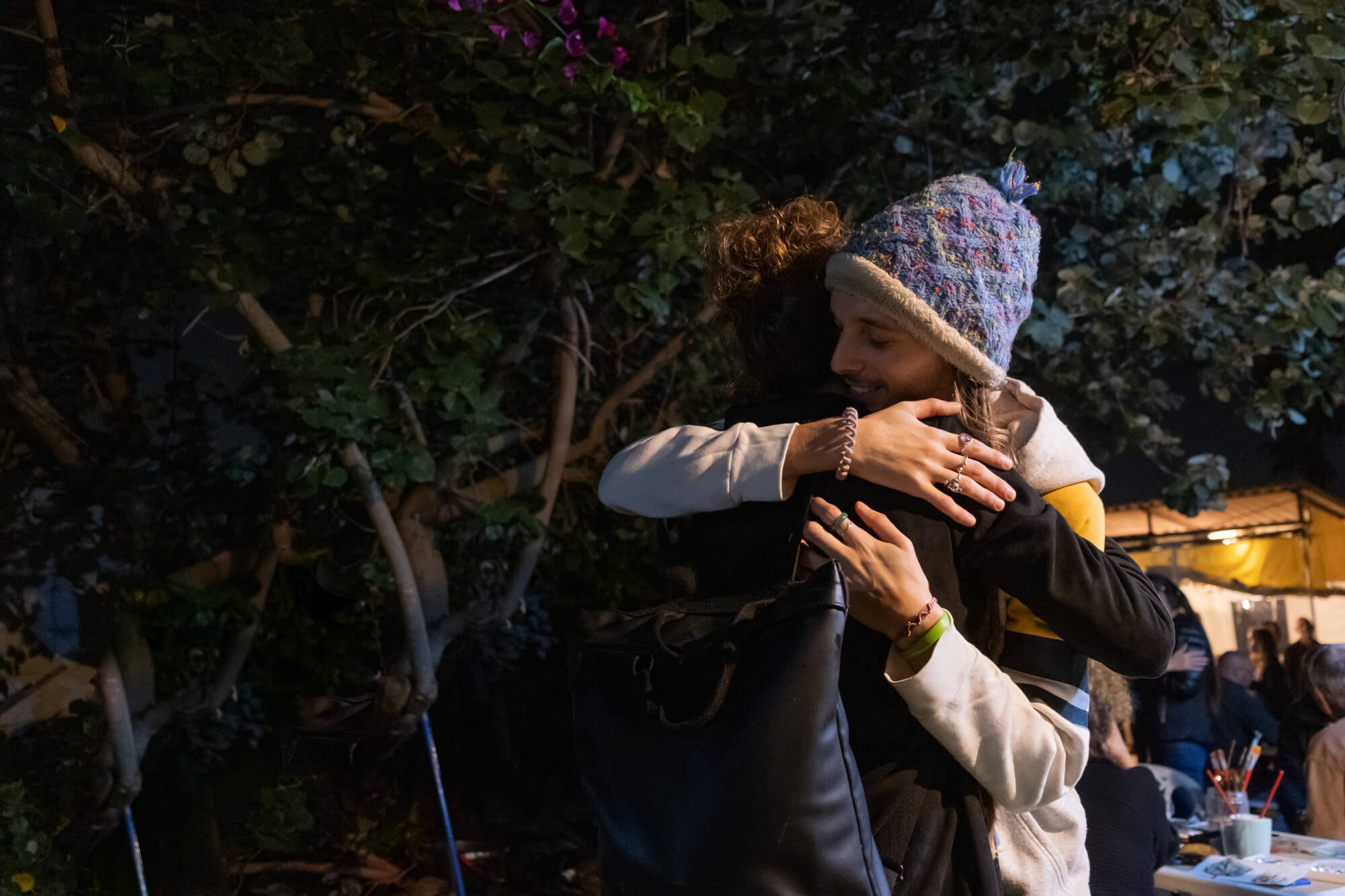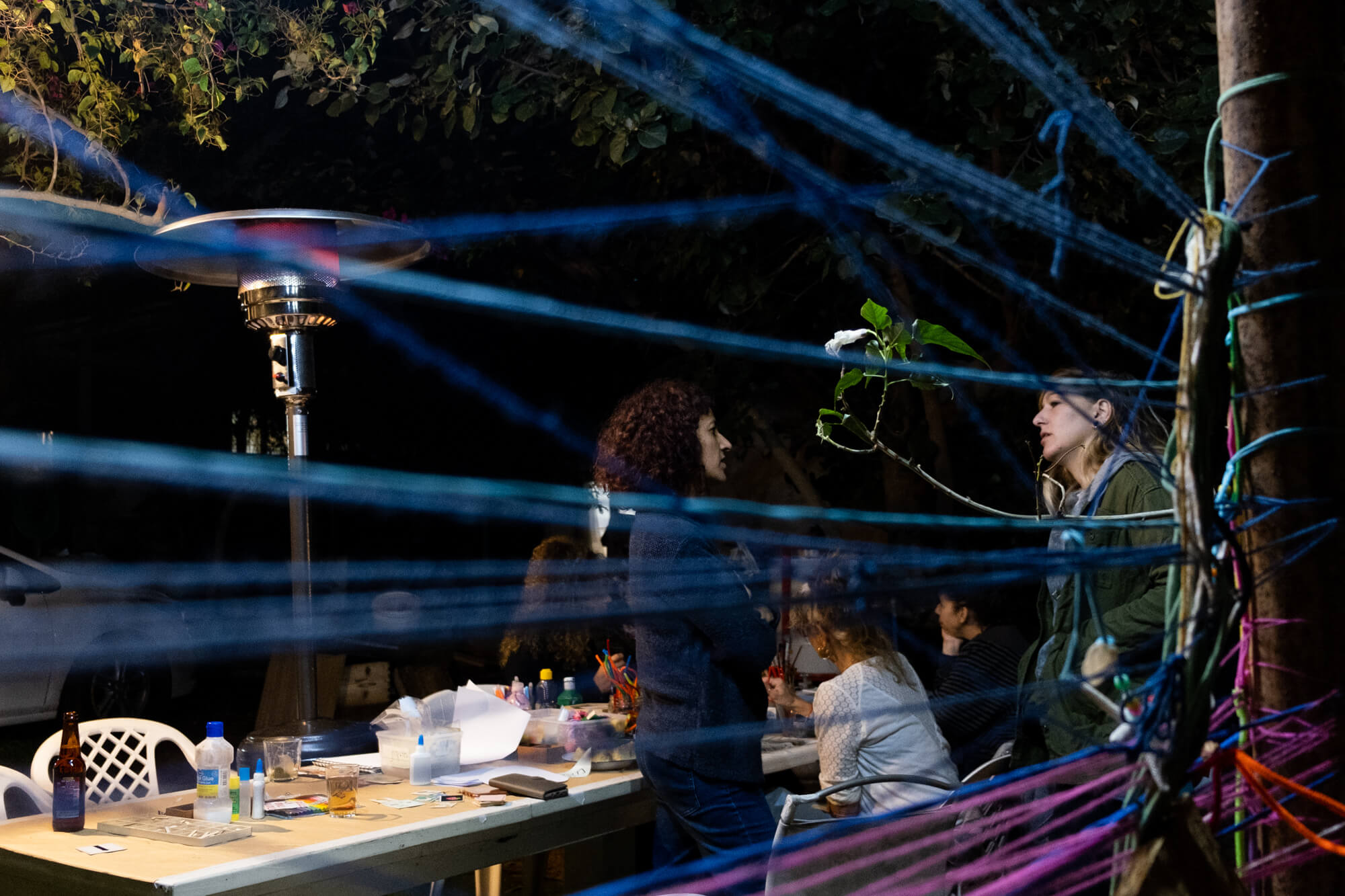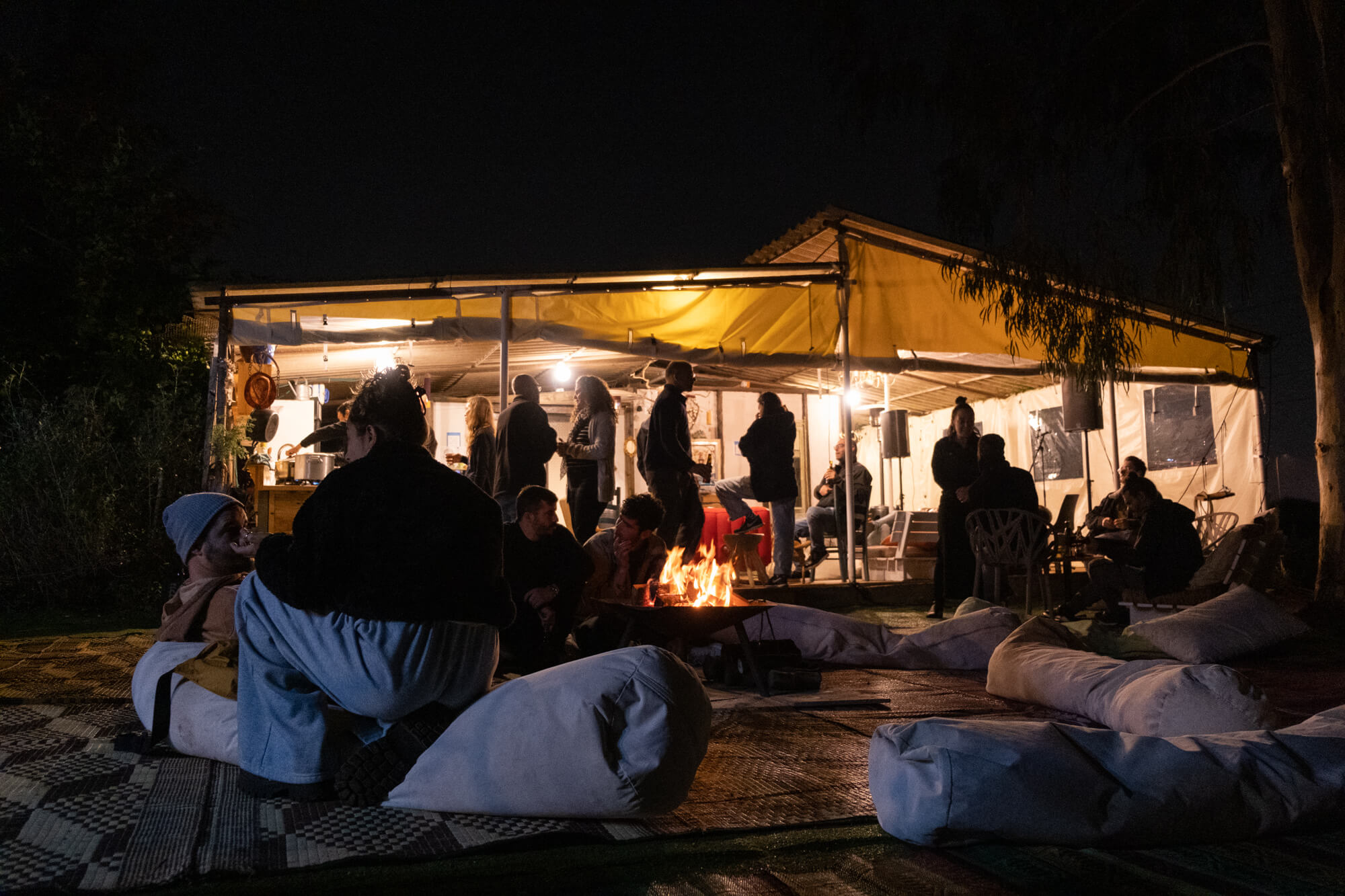‘This is our tribe’: In a makeshift tent, survivors of the Nova Music Festival massacre strive for healing
‘Connecting with other survivors helps us open up and move forward in our healing,’ one survivor said

Graphic by Angelie Zaslavsky
SITRIA, Israel — Past the yellow gates of this village of 1,000 residents, dozens of people gathered in a makeshift tent pieced together from wood and plastic tarps. They sat on faded pillows and white plastic chairs, talking, playing music and sharing warm pea soup.
Vered Peri, who survived the Nova Music Festival, where Hamas terrorists killed some 360 young people on Oct. 7, sat under the tent, mixing medicinal oils from 30 different bottles to create individual blends to ease the anxiety, grief and guilt of fellow survivors.
“There are no resources available for treating complex post-traumatic disorders, so we’re treating each other,” she said. “It lights me up to see what we’re creating.”
It’s a volunteer-run healing center specifically for Nova survivors and their families, in the backyard of Einat Haimovitz and her partner Yiftach Shahar, who are 50 and longtime members of the trance music community. In the first days after Oct. 7, only a handful of survivors showed up, but since early November, more than 100 people have been meeting here three times a week.
Shahar, a meditation guide, and Haimovitz, a psychotherapist, call the place Adama Tova, Hebrew for “good earth,” and many in this bruised and battered community see it as a second home. The day I visited, about 10 volunteers were on hand to provide counseling, shiatsu massage, art therapy, fresh food and relaxed conversations about life after Oct. 7.

“This is our tribe,” said Shahar, standing beside an outdoor kitchen where volunteers served warm soup and sliced chocolate cake made by Sitria residents. “If we won’t lift the hand, no one will.”
After the attack, survivors from the Nova festival were scattered across the country, isolated in their experiences and anguish. Itamar Or-Luz, a 24-year-old student, said he found a sense of control and community at Adama Tova, moving through his trauma alongside others who survived the brutal attack.
“We went through hell,” recounts Or-Luz, who lost nine friends that day, and only survived by hiding in a bush for eight hours. “I couldn’t sleep at night.”
Tal Ramba, an art therapist, recently set up what she called a “safe studio” at the center, a unique therapeutic model first developed for Ukrainian citizens affected by war with Russia. Ramba said she encourages participants to express themselves through indirect, nonverbal communication, which allows them to heal at their own pace.
At first, survivors hesitated to approach the tables stocked with colored pencils, paint brushes and cut magazine pages. “They weren’t able to pick up a paintbrush and begin something,” Ramba said. “To draw a line is an expression of life. It takes strength.”
Now, artwork decorates trees around the center. Blue and purple strings connect one tree to another, hand-painted plastic balls adorn the tent like Christmas ornaments. “Connecting with other survivors helps us open up and move forward in our healing,” Or-Luz said.
Some of the volunteers, who lack professional training, have struggled with the intensity of survivors’ trauma.
Eran Shani, 59, who welcomes survivors and families into the center, said that setting boundaries with survivors has been essential.

“One young man I spoke with shared horrifying things he had experienced again and again,” Shani said. “It took him time to ground himself afterwards. Now I direct the conversation away from the trauma to more positive directions.”
Ramba, the art therapist, said that having survivors like Peri also offer some treatments to others provides a sense of control and purpose. “They help us build this place,” she explained. “That makes them feel useful and meaningful. It makes them belong.”
In the last week, the center has opened focused treatment groups led by certified psychologists. Free of charge, they are meant to build communities and create support networks among groups of survivors and bereaved parents and siblings.
“Oct. 7th is an event based in communities. And here we’re creating one,” Liron Davidov, the center’s treatment coordinator, said. “It’s easier to grapple with this trauma in mutual strength.”
Shimon and Merav Buskila, whose 25-year-old son Yarden was murdered at the festival, first came to Adama Tova at the end of shiva, the first seven days of Jewish mourning.
“We’re fortunate to know about this place and meet other bereaved families,” said Shimon, who wore an etching of Yarden’s face on a silver necklace.
The couple visit Adama Tova weekly. They had been turned away from other trauma centers, like Ronit Farm, an event venue temporarily transformed into a treatment center for Nova survivors but not bereaved parents.
“It feels like we’re all on the same level here,” Shimon said. “We don’t need to explain or feel others pitying us. We can just be.”
At the center, they were able to gather more information about their son’s final moments. They spoke with survivors, piecing together Yarden’s attempt to escape — from his time in a public shelter, to the traffic jam he was killed in on his way out of the venue.
As Merav streaked watercolor lines of blue, yellow, and black paint on a piece of paper, she scrolled through pictures of Yarden. “We chose life,” she told me, surrounded by three art therapists at the table. “I can sleep a bit because of the energy of our people. This is a way to recharge.”
For others, the center is a place to leave their grief. “People come here to take a breath,” Ramba said. “It helps pull people in mourning out of their homes.”
Shahar, who lives in a modest home decades older than the center he built at the onset of the war, said he feels the pressure of maintaining the center’s ongoing support for survivors, but that he plans to keep it open for a year to support affected individuals and families in returning to normalcy.
Or-Luz plans to keep coming. “It’s the only way,” he said. “The trance world is an amazing place where people smile. And we don’t want to fall.”





















